|
|
|
Sort Order |
|
|
|
Items / Page
|
|
|
|
|
|
|
| Srl | Item |
| 1 |
ID:
172655
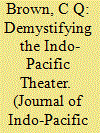

|
|
|
|
|
| Summary/Abstract |
Within the Indo-Pacific reside a number of dynamic and complex regional challenges with worldwide implications, including nuclear powers, disputed territories, ballistic missiles, and highly adaptive adversaries. Countering each of these challenges requires a whole-of-government approach in which the other three instruments of power understand that the military maintains a necessary level of readiness to backstop their combined efforts. Revisiting, in detail, the four NDS challenges in the Indo-Pacific validates this construct.
|
|
|
|
|
|
|
|
|
|
|
|
|
|
|
|
| 2 |
ID:
132877
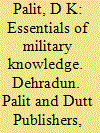

|
|
|
|
|
| Publication |
Dehradun, Palit and Dutt Publishers, 1970.
|
| Description |
230p.Hbk
|
| Contents |
B
|
|
|
|
|
|
|
|
|
|
|
|
Copies: C:1/I:0,R:0,Q:0
Circulation
| Accession# | Call# | Current Location | Status | Policy | Location |
| 057858 | 355/PAL 057858 | Main | On Shelf | General | |
|
|
|
|
| 3 |
ID:
087143
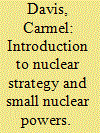

|
|
|
|
|
| Publication |
2009.
|
| Summary/Abstract |
This article analyzes the kinds of nuclear duels in which small nuclear powers might engage. It does so by articulating a deductive framework that describes the five ways force can be used. Nuclear weapons are means of force that can be used actively or passively to preserve or change the status quo and so can be used to support the resulting generic strategies of deterrence, defense, offense, and active and passive compellence. These are the politically purposive strategies available to conduct a nuclear duel. It then considers these strategies from the perspective of small nuclear powers by considering a case. Use of a single case makes for a more rigorous analysis of the relationship between strategies by forcing consideration of tradeoffs and complementarities. The awkwardness of the real world inherent in a single case cannot be sidestepped by use of convenient examples from other situations. North Korea is used because it is the focus of negotiations to abandon its nuclear program. In contrast, India, Israel, and Pakistan are not under international pressure at this time, and Iran does not yet possess nuclear weapons. The result is an exploration of the nuclear duel involving small nuclear powers intended to illuminate for non-specialists the opportunities, constraints, and interconnections within the space of possible nuclear strategies.
|
|
|
|
|
|
|
|
|
|
|
|
|
|
|
|
| 4 |
ID:
151784


|
|
|
| 5 |
ID:
131598
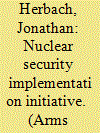

|
|
|
|
|
| Publication |
2014.
|
| Summary/Abstract |
The nuclear security summit that took place in The Hague in March was likely the penultimate gathering in the process that President Barack Obama started in 2009. As with the previous summits, in 2010 and 2012, participating states made a number of pledges to reduce the amounts of nuclear material within their borders and to better secure remaining nuclear and other radioactive materials. In one of the major developments of this year's summit, several states went further than before in taking concrete steps aimed at enhancing the legal and regulatory framework with a view to ensuring sustainability of nuclear security efforts. This was manifested most directly in the initiative on strengthening nuclear security implementation, announced by the Netherlands, South Korea, and the United States and joined by two-thirds of the participating states.[1] The initiative was one of the most publicized outcomes of the meeting and arguably the most significant.[2] It looks toward laying the groundwork for a more robust international system based on national commitments to the application of international principles and guidelines[3] and to continuous improvement of nuclear security regimes through peer reviews and other methods. The question is how this initiative will actually be put into practice. The commitment to conduct self-assessments, host peer reviews periodically, and act on recommendations stemming from such reviews is fairly clearly formulated, whereas some of the language is quite general, referring to "meet[ing] the intent of" international nuclear security guidelines and "subscrib[ing] to" a set of fundamental principles developed under the auspices of the International Atomic Energy Agency (IAEA). Therefore, although the initiative holds potentially far-reaching consequences for the future strength of the nuclear security regime, such consequences will largely depend on how subscribing states choose to interpret the commitments. If the initiative is to have a strong impact, states will need to take the view that it lays a foundation on which they can build through further actions rather than being a final goal in itself.
|
|
|
|
|
|
|
|
|
|
|
|
|
|
|
|
| 6 |
ID:
096990


|
|
|
| 7 |
ID:
100466
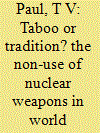

|
|
|
|
|
| Publication |
2010.
|
| Summary/Abstract |
The non-use of nuclear weapons since Hiroshima and Nagasaki in 1945 has emerged as a major puzzle in international politics. Traditional International Relations scholarship views this largely as a function of the deterrent relationship that emerged between the nuclear powers, especially during the Cold War era. The fact that nuclear weapons have not been used against non-nuclear states, despite temptations to use them, remains a challenge to the deterrence-only explanation. More normatively oriented scholars have argued that a taboo has emerged against the non-use of nuclear weapons. Nina Tannenwald's book, The Nuclear Taboo is the most comprehensive study on this subject which relies on constructivist logic of inter-subjective taboo-like prohibition in accounting for the puzzle. While I see much merit in Tannenwald's empirical case studies, it is far-fetched to call the non-use largely a function of a taboo-like prohibition. For, taboos by their very nature forbid discussions of their breaking, whereas nuclear states have national military strategies that call for nuclear use under certain circumstances. They have also in many crises situations considered the use of nuclear weapons. I have argued in my book, The Tradition of Non-use of Nuclear Weapons (Stanford University Press, 2009), that a more modest tradition can be given partial credit for the absence of nuclear attacks on non-nuclear states. The tradition emerged because of a realisation of the horrendous effects of nuclear attack (a material fact) which generated reputation costs for a potential user. These reputation costs in turn generated self-deterrence which has helped to create a tradition which is partially restraining nuclear states from using their weapons for anything other than existential deterrence. Unlike Tannenwald, I contend that the tradition is not a strict taboo and hence it can be altered if material and political circumstances compel nuclear states to do so. The recent policy changes that have taken place in nuclear powers such as the US, Russia, UK, and France do not augur well for the tradition as the conditions for atomic use have been expanded to include prevention, pre-emption and other non-proliferation objectives involving rogue states and terrorist groups.
|
|
|
|
|
|
|
|
|
|
|
|
|
|
|
|
| 8 |
ID:
143258


|
|
|
|
|
| Summary/Abstract |
A historic rapprochement is transforming the Taiwan Strait, which until recently had been considered a “flashpoint” in Asia that could embroil two nuclear powers. This détente occurs amidst a momentous power transition in the Asia-Pacific. Many see the U.S. “Pacific Pivot” as a response to China's recent assertive policies, the shifting power balance caused by the 2008 global financial crisis, and the realization that Asia holds the key to the economic and security futures of the United States. And yet the Obama Administration's official statements on the pivot policy were nearly silent on Taiwan. What explains the near official silence on the role of Taiwan in the U.S. pivot policy? This article examines three hypotheses: (1) “The Lost Cause” thesis (i.e., Pivot without Taiwan), (2) “The Fate Undetermined” thesis (i.e., Pivot, then Taiwan), and (3) “The Tacit Alliance” thesis (i.e., Pivot with Taiwan, in deed if not in word) against available evidence and assesses the positive and negative implications of the evolving cross-strait relations for the U.S. pivot to Asia, as well as the U.S. policy's impact on cross-strait relations
|
|
|
|
|
|
|
|
|
|
|
|
|
|
|
|
| 9 |
ID:
119253


|
|
|
|
|
| Publication |
2013.
|
| Summary/Abstract |
Nuclear weapons remain deeply embedded not only in strategic thinking and force postures, but also in our political cultures in ways that assign multiple, powerful socio-political values to the bomb. Progress towards nuclear zero will necessarily require peeling away the layers of value to the point where it becomes politically, strategically, and socially acceptable to permanently relinquish a nuclear capability. The concept and process of devaluing nuclear weapons is contested. It is a broad concept that covers notions of reducing the role, delegitimizing, reducing the salience, and marginalizing nuclear weapons in the declaratory and operational policies of the nuclear powers. This article argues that to understand what a process of devaluing might look like, we first need a deeper understanding of how nuclear weapons are valued. To achieve this, the article moves through four stages. First, it provides an overview of the lexicon of devaluing and subsidiary terms in global nuclear discourse since the end of the Cold War. Second, it discusses how we know nuclear value and its discursive construction. Third, using the United Kingdom as a case study it explores the 'regime of value' in which British nuclear weapons are embedded and the implications for devaluing. Finally, it reflects on William Walker's notion of 'responsible nuclear sovereignty' and the tensions at the nexus of deterrence/devaluing.
|
|
|
|
|
|
|
|
|
|
|
|
|
|
|
|
| 10 |
ID:
100714
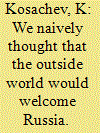

|
|
|
|
|
| Publication |
2010.
|
| Summary/Abstract |
International Affairs: Konstantin Iosifovich, after extensive and very strained negotiations, Russian President Dmitry Medvedev and U.S. President Barack Obama signed a treaty on the reduction of strategic offensive weapons. Needless to say, this is a landmark event in the history of international relations. How do you assess the signing of the new START treaty?
|
|
|
|
|
|
|
|
|
|
|
|
|
|
|
|
| 11 |
ID:
177086


|
|
|
|
|
|
|
|